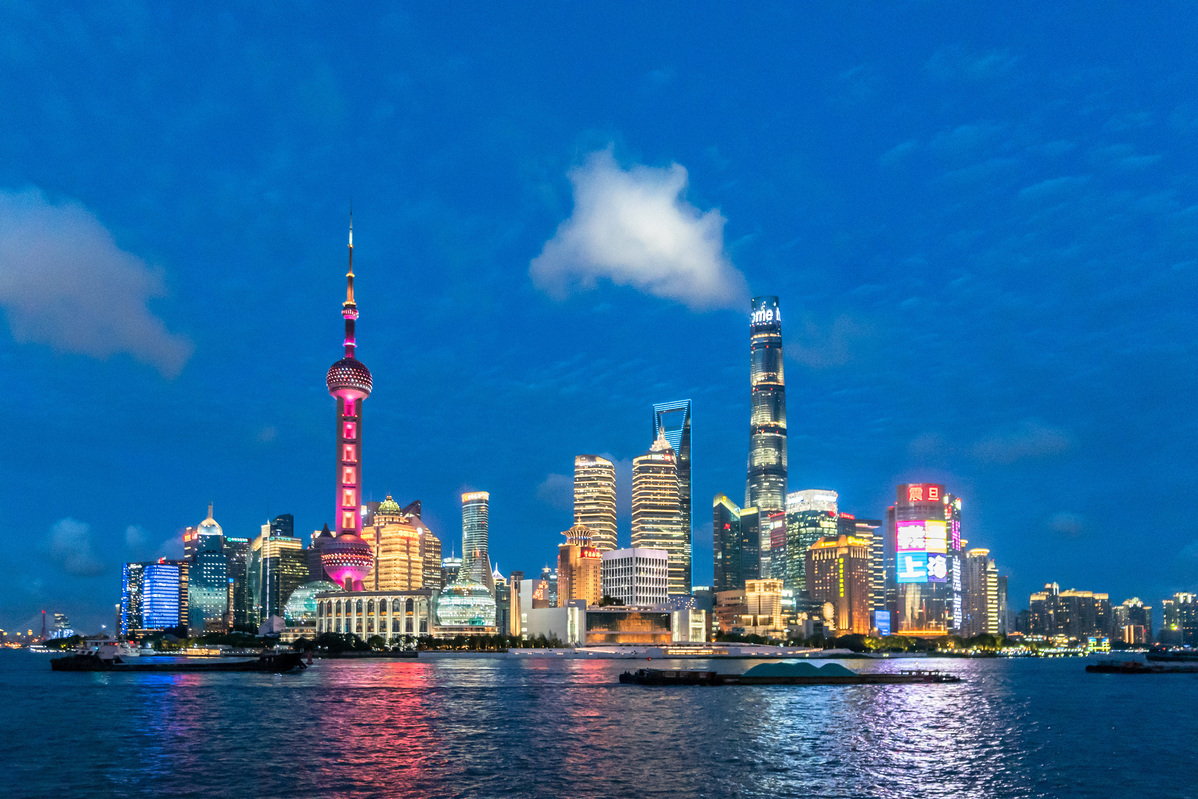Shanghai nets range of multinationals

Enterprises attracted by investment potential in financial hub
The Chinese team at German chemicals maker Covestro is making every effort to land a major investment project for Shanghai.
The team, which has examined every detail of the project, is planning a videoconference between the city's leaders and Covestro's global CEO to discuss it, according to Holly Lei, senior vice-president of Covestro Group and president of Covestro China.
She added that the team is working flat out to push the group's headquarters into awarding the project-details of which have not been disclosed-to Shanghai.
"The city is extremely important for us. It is our home, where we have the Shanghai integrated site, the company's largest site worldwide, as well as an Asia-Pacific research and development center," Lei said.
Covestro is not the only company to view Shanghai as an attractive proposition.
On June 15, the municipal authorities certified 30 regional headquarters for global corporations and 10 research and development centers in Shanghai, indicating the city's pulling power as an investment destination for multinationals, despite the impact of the recent COVID-19 outbreak locally.
Such companies' confidence is based on their development and the financial hub's growth in past decades.
Fujiwara Kentaro, CEO of Shiseido China, said, "The Shanghai municipal government has been fully supportive of efforts to restore our business after the outbreak. With China now Shiseido's largest overseas market, we remain optimistic regarding the nation's economic outlook and market potential."
In recent years, the Japanese cosmetics giant has seized opportunities to explore the Chinese market and deepen its local innovation capability.
By launching its third China Innovation Center at Oriental Beauty Valley, one of China's largest cosmetics and health industrial hubs, located in Shanghai's Fengxian district, Shiseido is committed to strengthening its research and development, or R&D, and innovation tailored for the Chinese market.
Eddy Chan, senior vice-president of FedEx Express and president of FedEx China, said, "Over the years, the Chinese government and the Shanghai municipal authorities have always provided a prime business environment for foreign enterprises, and Shanghai has witnessed many milestones achieved by FedEx in its development in China."
The company opened the FedEx Shanghai International Express and Cargo Hub at Shanghai Pudong International Airport in 2018, Chan said. The center is not only an important facility for FedEx in the Asia-Pacific region, but also the largest of its kind at the airport. It also enables greater access to the company's global network for customers in eastern China, particularly those shipping goods to the United States and Europe.

After the recent COVID-19 outbreak, FedEx resumed operations in Shanghai at the start of this month, fully supporting the local authorities' efforts to contain the disease.
"We are positive about China's business environment, and we are fully confident in Shanghai's economic development and investment outlook," Chan said.
Together with the city's rapid recovery from the outbreak, multinationals' confidence in Shanghai is based on the city's achievements.
In 2020, the metropolis basically became a global center for economic, financial, trade, shipping and technological innovation. It is now on its way to further strengthening four major functions: allocating global resources; initiating technological innovation; leading development of high-end industries; and becoming an opening-up gateway. These functions are in line with requirements stressed by President Xi Jinping during his visit to Shanghai in November 2019.

Deals signed
Although the local spread of COVID-19 has not yet been completely contained, business activity is bustling again in Shanghai.
On June 16, a ceremony was held to mark 322 major industrial projects with a combined investment of 565.8 billion yuan being signed in Shanghai. It also celebrated the start of construction on 48 other projects worth 162.7 billion yuan.
In total, 90 of the new projects involve the integrated circuits, biopharmaceuticals and artificial intelligence industries, with the city striving to accelerate their development in the past few years.
A number of the investments have been placed by multinationals.
Xiao Song, global executive vice-president of Siemens and chairman, president and CEO of Siemens China, said, "More than 80 percent of Siemens' major production in Shanghai has been restored so far, and we will continue to expand our investment in the city."
The German technology company has established a complete localized value chain in Shanghai, ranging from R&D to manufacturing and services.
Xiang Xiaofang, vice-president of Ford China, said the impact of the pandemic will not shake the company's confidence in China.
Ford, which has been in the Chinese market for 27 years, has produced millions of vehicles in the country, and continues to believe that China offers tremendous opportunities, according to Xiang.
"This year, we will continue our transformation in electrification and intelligentization in China, as well as providing Chinese consumers with Ford's best products and services," Xiang said.
Ming Cheng Chien, Asia-Pacific president for Lanxess, a German specialty chemicals company, said, "We are continuously seeking opportunities in China, and the Chinese government's efforts have allowed multinational corporations such as Lanxess to constantly find new opportunities, and raise assets and investments to coordinate with development of the Chinese economy."
As the world's largest chemical production and sales market, China not only supports this market globally, but also serves the worldwide supply chain, Chien said. For example, Shanghai Port, the world's largest container port, plays a vital role in maintaining global supply chain stability.
"We are glad the Chinese government and the Shanghai municipal authorities have taken effective measures to maintain the supply chain while combating COVID-19.Such action will not only support our domestic production, but also ensure Lanxess' global production," Chien said.
Confronting the challenges posed by COVID-19, Lanxess opened its Asia-Pacific application development center at Shanghai Chemical Industry Park last year.
Meanwhile, Zhou Zhaolin, vice-president of Milliken Chemical Asia, a company based in the United States, said it is expanding its packaging innovation center in Shanghai. The expansion is aimed at further enhancing collaborative innovation with upstream and downstream enterprises.
This month, Milliken resumed projects affected by the pandemic, including upgrading the center. Other works are being accelerated. According to Zhou, Milliken will continue to increase business investment in China.
Chemical manufacturer BASF China said the experience of the past few months has shown its employees' dedication and resilience despite changes and challenges posed by COVID-19.
The company said: "China, the biggest chemicals market in the world, is projected to account for 50 percent of the global chemical market share by 2030. BASF still has plenty of room for further growth in China. Our investments in local production and R&D will continue."
The German chemical giant resumed normal operations at its sites in Shanghai after coming out of closed-loop management on June 10.Its average production capacity in the city has been more than 70 percent since the middle of last month.
As a major foreign investor in China's chemical industry, BASF operates the Innovation Campus Shanghai, a global and regional R&D hub. Opened in November 2012, it is the company's largest such site in the region.
Over the past five years, the Innovation Campus Shanghai has applied for more than 220 patents, and it also plays an increasing role in developing innovation for the automotive, construction, and consumer goods industries, according to a written response from BASF China.
Expo attendance
Fully confident in the Chinese market, Brother Industries, a machinery and solutions company based in Japan, will continue developing in China and contribute to Shanghai's economic restoration and revitalization.
Preparing to resume business after the COVID-19 outbreak, Brother (China) will take part in the fifth China International Import Expo, or CIIE, in Shanghai in November.
Yin Bingxin, chairman and president of Brother (China), said: "Our company has gained a lot from the expo's spillover effect. This prompted our decision to participate in the expo, and we invite our business partners in China to join us at the event."
With China committed to opening-up and promoting global development, Shanghai has successfully held four CIIEs by attracting businesses from across the world. Foreign enterprises view the expo as a platform to showcase their products, technology and innovation.
DuPont, a science and technology company based in the US, is another active participant in the event. "We have confirmed our participation in the fifth CIIE, and we are planning to occupy a bigger booth this year," said Zhang Yi, president of DuPont Asia-Pacific.
"We have innovative solutions for mega trends in China, including new energy vehicles, renewable energy, environmental protection, electronics, 5G communications, and advanced manufacturing technology, among others," Zhang said.
Fujiwara, from Shiseido, said, "We showcase our technological and innovative achievements through the platform offered by the expo." The company is taking part in the event for the fourth consecutive year.
By the end of last year, more than 60,000 foreign enterprises were invested in Shanghai. The city is also home to 848 multinationals' regional headquarters, and as of the end of last month it had 512 R&D centers funded by foreign capital.
On May 29, Shanghai announced a 50-measure action plan to fully assist domestic and foreign enterprises to recover from challenges posed by the COVID-19 outbreak.
Xiang, from Ford, said that to ensure its production and supply chain stability in China and globally, the company contacted the Shanghai authorities, who provided prompt support and various solutions for Ford and its key component suppliers.
"To date, production at Ford's major suppliers in Shanghai has returned to more than 80 percent of the pre-pandemic level, greatly easing pressure on the global supply chain," Xiang said.
President Xi Jinping, in the keynote speech at the opening ceremony of the third CIIE in 2020, said: "As we often say in China, 'Those who do not make their way to the Great Wall are not true heroes.' Now, at a time of formidable challenges facing the global economy, it is imperative that we bolster confidence and courage to tide us over this difficult period together.
"China will join hands with all countries to create opportunities in opening-up, tackle difficult problems through cooperation, and foster a brighter future for humanity."
Zhong Nan in Beijing contributed to this story.
Invest in China Copyright © 2026 China Daily All rights Reserved
京ICP备13028878号-6
 京公网安备 11010502032503号
京公网安备 11010502032503号





